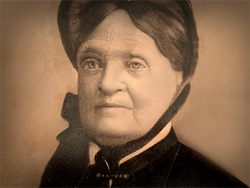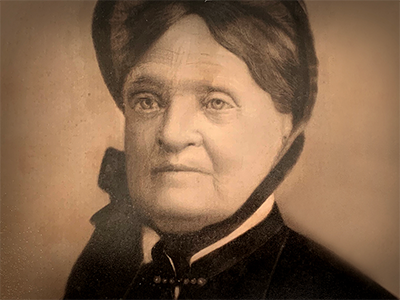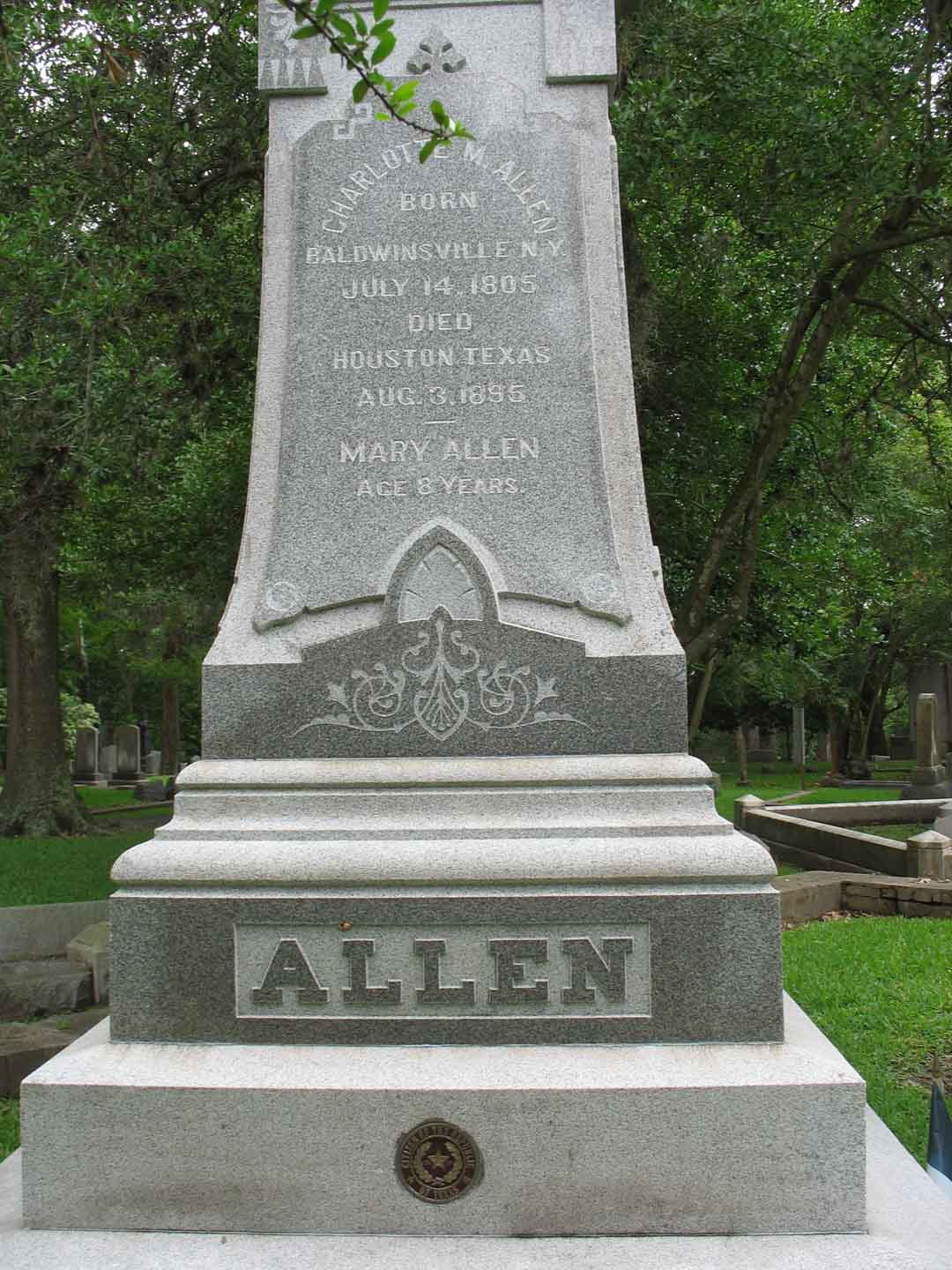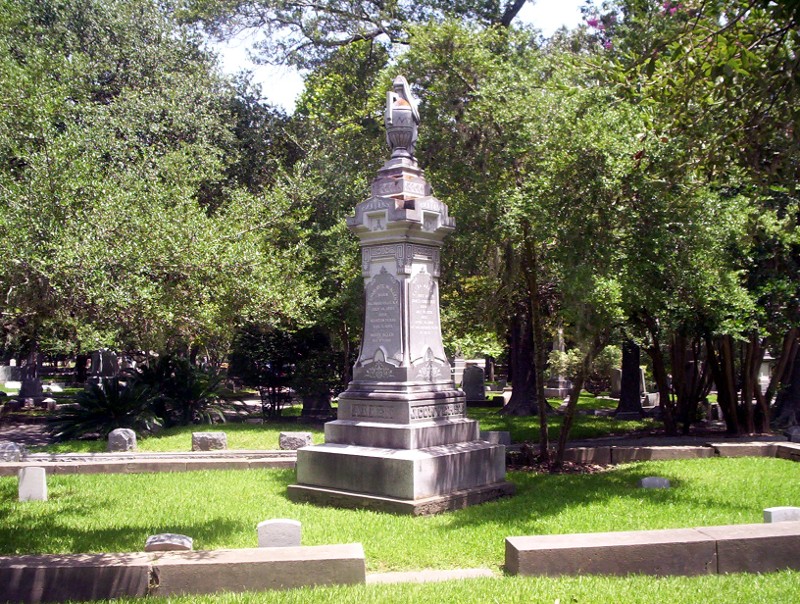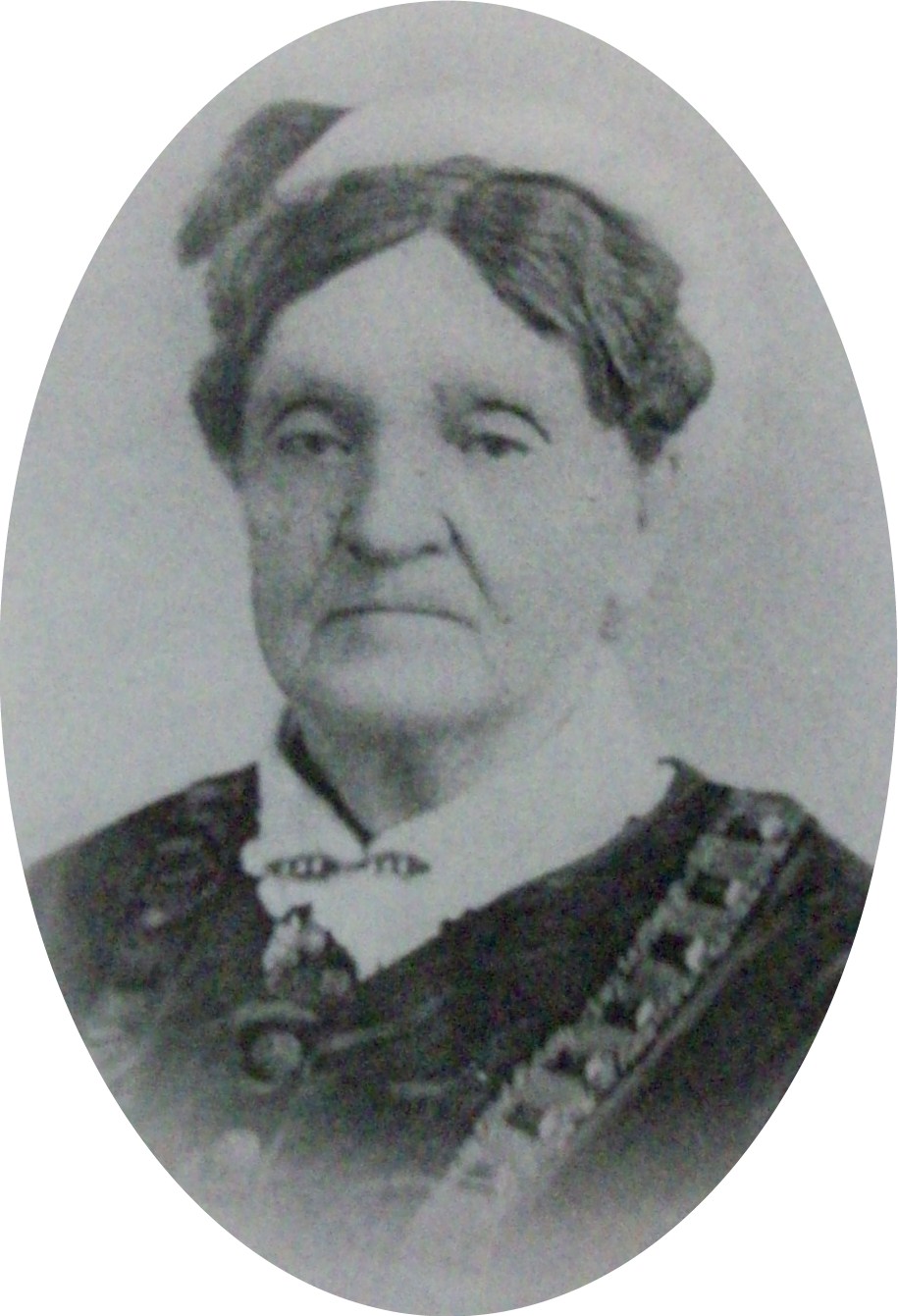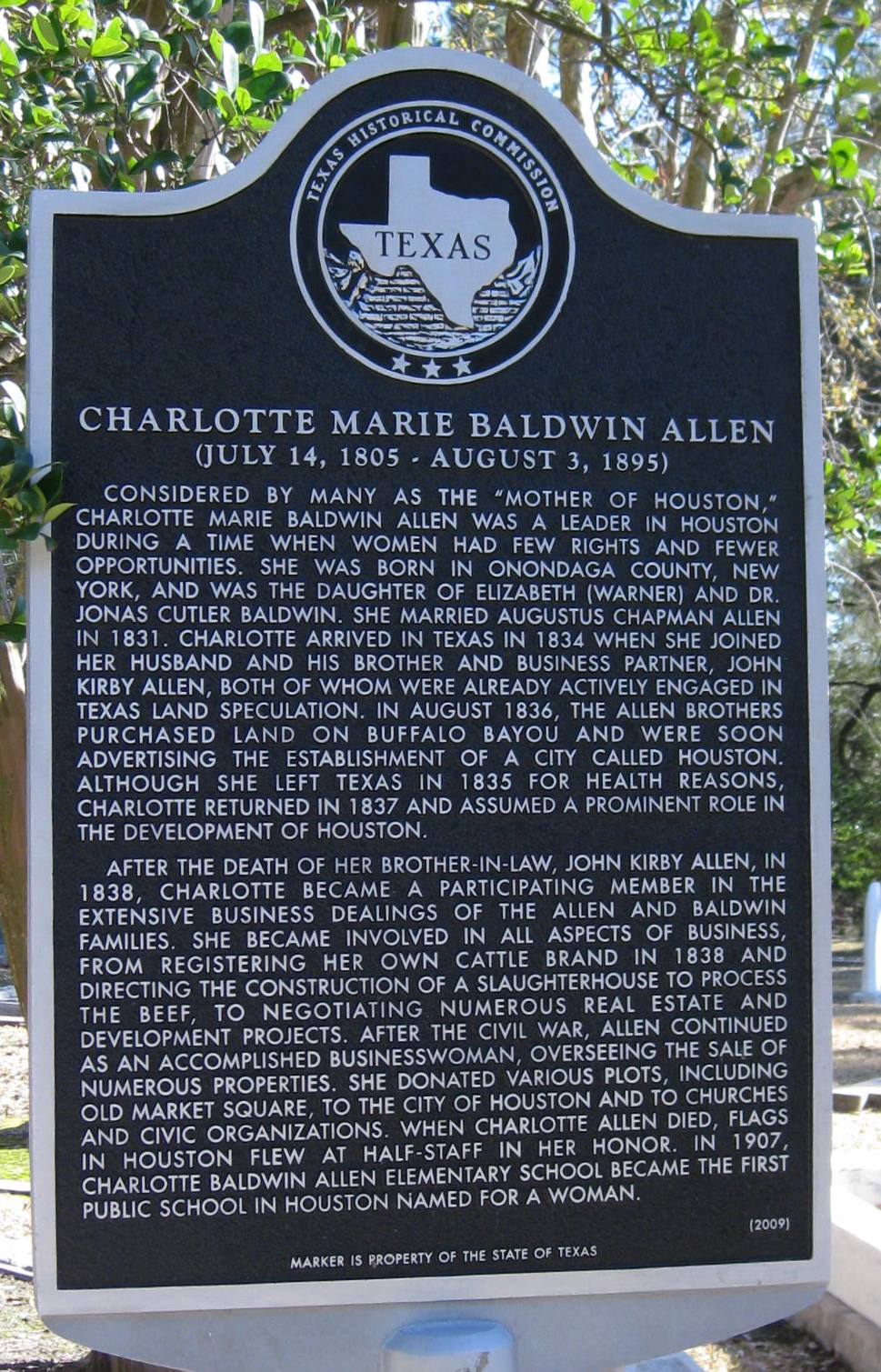Charlotte M. Allen, widow of Augustus C. Allen, now stands as the oldest surviving settler in Houston, and is justly entitled to the distinction of being called one of the mothers of Texas. She was born in Onondaga county, New York, July 14, 1805. She was married to Mr. Allen, as stated, in 1831, and came to Texas in 1834. She resided at Nacogdoches until after the town of Houston was laid out, when she came to this place, of which she has since been a resident. She has seen the place grow, as one may say, from a town on paper to the splendid city that it is, and during all this time has been its steadfast friend, and indeed the friend of all who needed her friendship. With the hundreds of avenues now open to those in search of employment, with scores of hotels to accommodate the wayfarers, with hospitals and infirmaries to care for the sick, and boards of charity to help the poor, and all the other multiplied comforts and conveniences of this advanced age of living, it is difficult for us to understand how poorly the early settlers were equipped for dealing with the ever-pressing problems of want, sickness and destitution, and it is especially hard for us to fully appreciate the heroic self-sacrifice which many of them underwent to aid those in distress. Houston had at all times its share of homeless wanderers,--its sick, poorly clad and poorly fed,--who constantly appealed to the charity and benevolence of its people; and to the women,--the noble motherhood of the city,--as is always the case, these appeals were chiefly made, and upon their shoulders the burden mainly rested. Many who are now aged men and women have told the writer that the door of the Allen homestead always stood open, and that the hungry, the sick and the destitute were always welcome, were fed, clothed and nursed without money and without price. Its mistress was the friend of a needy and the comforter of those in distress. At the mention of her name many do, and have just reasons to, breathe blessings on her memory.
Mr. and Mrs. Allen had born to them four children, only one of whom,--a daughter, Martha Elizabeth Warner,--ever reached maturity. She was born in Houston on the 18th of July, 1838, and in this city married F. B. Chase, on April 19, 1859, and was made a widow by his death on the 20th of November following. She was married to James Converse, at Houston, September 21, 1863, and died at San Antonio April 14, 1886. She left one son, Thomas Pierce Converse, now the only descendant of the honored pioneers, Augustus C. and Charlotte M. Allen.
Certainly no other family has been longer, and probably none more prominenty, connected with the history of the city of Houston than the Allen. Mention of several members of this family appears within the pages of this work (see sketch of the Allen family). It is the purpose of this article to place on record the chief facts in the life of Augustus C., the eldest of the six brothers, and one of the two who figured most conspicuously in the founding of the city, in connection with which will also be given a brief memoir of his aged widow, now the oldest surviving settler of Houston.
Augustus C. Allen was born at Saratoga, New York, July 4, 1806. He grew up in Oneida county, and received what was for those days a good business education. He had some natural inclination for books, and for a time was professor of mathematics in the Polytechnic Institute at Chittenango. He then went to New York city, where he became interested in the banking business, and where he resided for four or five years. From that city he moved to Baldwinsville and there embarked in mercantile pursuits. At Baldwinsville he formed the acquaintance of Charlotte M., daughter of Dr. Jonas C. Baldwin, the founder of the town, and on May 3, 1831, married her.
In the spring of 1833, in company with his brother, John K., Mr. Allen came to Texas and established himself temporarily at Nacogdoches, where he launched out into land speculations, which he conducted profitably in that general vicinity for somewhat over two years. It may be mentioned in passing that he and his brother were the pioneer real-estate dealers of Texas, and probably did more than any other two men of those times to direct attention to land values in this country. The boldness with which they invested their funds in certificates, and their success in disposing of claims which they located, inspired among settlers and capitalists confidence in the future of the country, at a time when such confidence was badly needed.
After the battle of San Jacinto,--it is generally said in August, 1836,--Augustus C. and John K. Allen arrived on Buffalo Bayou with a well matured plan for a town, which they hoped to have made the temporary capital of the new Republic. They secured the title from Mrs. T. F. L. Parrott to the lower half of two leagues of land which had been granted to her former husband, John Austin, and here they laid out a town. It was planned on a generous scale, and proper provision made in the way of donation of lots for school, church and other purposes. The question as to the naming of the town was debated for some time, but the matter was finally settled by Mrs. Charlotte M. Allen, who decided on the one which it now bears,--being so named in honor of the first President of the Republic, General Sam Houston, who was then and ever afterwards a warm friend of the Allen family. Propositions were at once made to the Texas Congress, then in session at Columbia, Brazoria county, for the removal of the capital of the Republic to this place, which overtures were accepted, and in May, 1837, Houston became the temporary seat of government. The Messrs. Allen built of their own means the first State house, which was a two-story wooden structure that stood on the corner of Main Street and Texas Avenue, on the site now occupied by the Capitol Hotel. Houston continued to be the capital of the Republic until October, 1839, when it was removed to Austin. During this time it attracted hither many settlers, traders and adventurers, who were then coming into the country,--a sufficient number of whom remained to form the basis of a stable population and to give the town a good start in growth. In 1838 John K. Allen died, but Augustus C. continued in charge of their interests in the town and sought in every way to build it up and make a prosperous place of it. He was also interested in land speculations in other portions of the State and was in fact known all over Texas as a man with energy and public spirit combined with great business sagacity.
Mr. Allen made Houston his home until about 1852, when, having been appointed United States Consul at Minatitlan, Isthmus of Tehuantepec, he transferred a considerable part of his interests to that place, and was there engaged in business and as a representative of the General Government about ten years. During this time he established, in connection with a Mr. Welsh, an Englishman, a trade from Minatitlan to Europe, through a line of sail vessels, shipping largely and profitably, vanilla, cochineal, dye-woods and mahogany. After the war opened between the North and the South Mr. Allen went to Washington to settle his accounts with the Government, resigning his office and engaging in the banking business in New York. But his health, which had been declining for two or three years, now rapidly grew worse and, although he made a tour of several months through the West Indies in search of restoration, he returned to Washington no better; and at the Willard Hotel in that city he died, in 1863.
His wife, who had remained in Texas during this time, having heard of his continued ill health, started to him, but was delayed on account of the blockade, being forced to go around by way of Matamoras, and reached him after he had breathed his last, but in time to see his remains laid to rest in the beautiful Greenwood cemetery, at Brooklyn, New York, in the soil of his native State.
Mr. Allen came to Texas in the darkest hour of her history. That his example of taking vigorous hold of the business interests of the country inspired others with confidence in its future, there can be no doubt, and that he felt a deep concern for her political welfare, is equally certain. He and General Houston were always warm friends, the General making his home under Mr. Allen's roof for more than three years. Like many others of the early settlers he reaped but little advantage from his early toils, but his plans were nevertheless well laid and his work well and faithfully done.
Mr. Allen is described as being small in stature, of closely knit frame, full of energy and possessing a cool, level head. He was not a leader of men but a well trained man of business, especially noted for his far-sightedness and his enthusiastic confidence in the future.(Source: History of Texas Biographical History of the cities of Houston & Galveston (1895
Charlotte M. Allen, widow of Augustus C. Allen, now stands as the oldest surviving settler in Houston, and is justly entitled to the distinction of being called one of the mothers of Texas. She was born in Onondaga county, New York, July 14, 1805. She was married to Mr. Allen, as stated, in 1831, and came to Texas in 1834. She resided at Nacogdoches until after the town of Houston was laid out, when she came to this place, of which she has since been a resident. She has seen the place grow, as one may say, from a town on paper to the splendid city that it is, and during all this time has been its steadfast friend, and indeed the friend of all who needed her friendship. With the hundreds of avenues now open to those in search of employment, with scores of hotels to accommodate the wayfarers, with hospitals and infirmaries to care for the sick, and boards of charity to help the poor, and all the other multiplied comforts and conveniences of this advanced age of living, it is difficult for us to understand how poorly the early settlers were equipped for dealing with the ever-pressing problems of want, sickness and destitution, and it is especially hard for us to fully appreciate the heroic self-sacrifice which many of them underwent to aid those in distress. Houston had at all times its share of homeless wanderers,--its sick, poorly clad and poorly fed,--who constantly appealed to the charity and benevolence of its people; and to the women,--the noble motherhood of the city,--as is always the case, these appeals were chiefly made, and upon their shoulders the burden mainly rested. Many who are now aged men and women have told the writer that the door of the Allen homestead always stood open, and that the hungry, the sick and the destitute were always welcome, were fed, clothed and nursed without money and without price. Its mistress was the friend of a needy and the comforter of those in distress. At the mention of her name many do, and have just reasons to, breathe blessings on her memory.
Mr. and Mrs. Allen had born to them four children, only one of whom,--a daughter, Martha Elizabeth Warner,--ever reached maturity. She was born in Houston on the 18th of July, 1838, and in this city married F. B. Chase, on April 19, 1859, and was made a widow by his death on the 20th of November following. She was married to James Converse, at Houston, September 21, 1863, and died at San Antonio April 14, 1886. She left one son, Thomas Pierce Converse, now the only descendant of the honored pioneers, Augustus C. and Charlotte M. Allen.
Certainly no other family has been longer, and probably none more prominenty, connected with the history of the city of Houston than the Allen. Mention of several members of this family appears within the pages of this work (see sketch of the Allen family). It is the purpose of this article to place on record the chief facts in the life of Augustus C., the eldest of the six brothers, and one of the two who figured most conspicuously in the founding of the city, in connection with which will also be given a brief memoir of his aged widow, now the oldest surviving settler of Houston.
Augustus C. Allen was born at Saratoga, New York, July 4, 1806. He grew up in Oneida county, and received what was for those days a good business education. He had some natural inclination for books, and for a time was professor of mathematics in the Polytechnic Institute at Chittenango. He then went to New York city, where he became interested in the banking business, and where he resided for four or five years. From that city he moved to Baldwinsville and there embarked in mercantile pursuits. At Baldwinsville he formed the acquaintance of Charlotte M., daughter of Dr. Jonas C. Baldwin, the founder of the town, and on May 3, 1831, married her.
In the spring of 1833, in company with his brother, John K., Mr. Allen came to Texas and established himself temporarily at Nacogdoches, where he launched out into land speculations, which he conducted profitably in that general vicinity for somewhat over two years. It may be mentioned in passing that he and his brother were the pioneer real-estate dealers of Texas, and probably did more than any other two men of those times to direct attention to land values in this country. The boldness with which they invested their funds in certificates, and their success in disposing of claims which they located, inspired among settlers and capitalists confidence in the future of the country, at a time when such confidence was badly needed.
After the battle of San Jacinto,--it is generally said in August, 1836,--Augustus C. and John K. Allen arrived on Buffalo Bayou with a well matured plan for a town, which they hoped to have made the temporary capital of the new Republic. They secured the title from Mrs. T. F. L. Parrott to the lower half of two leagues of land which had been granted to her former husband, John Austin, and here they laid out a town. It was planned on a generous scale, and proper provision made in the way of donation of lots for school, church and other purposes. The question as to the naming of the town was debated for some time, but the matter was finally settled by Mrs. Charlotte M. Allen, who decided on the one which it now bears,--being so named in honor of the first President of the Republic, General Sam Houston, who was then and ever afterwards a warm friend of the Allen family. Propositions were at once made to the Texas Congress, then in session at Columbia, Brazoria county, for the removal of the capital of the Republic to this place, which overtures were accepted, and in May, 1837, Houston became the temporary seat of government. The Messrs. Allen built of their own means the first State house, which was a two-story wooden structure that stood on the corner of Main Street and Texas Avenue, on the site now occupied by the Capitol Hotel. Houston continued to be the capital of the Republic until October, 1839, when it was removed to Austin. During this time it attracted hither many settlers, traders and adventurers, who were then coming into the country,--a sufficient number of whom remained to form the basis of a stable population and to give the town a good start in growth. In 1838 John K. Allen died, but Augustus C. continued in charge of their interests in the town and sought in every way to build it up and make a prosperous place of it. He was also interested in land speculations in other portions of the State and was in fact known all over Texas as a man with energy and public spirit combined with great business sagacity.
Mr. Allen made Houston his home until about 1852, when, having been appointed United States Consul at Minatitlan, Isthmus of Tehuantepec, he transferred a considerable part of his interests to that place, and was there engaged in business and as a representative of the General Government about ten years. During this time he established, in connection with a Mr. Welsh, an Englishman, a trade from Minatitlan to Europe, through a line of sail vessels, shipping largely and profitably, vanilla, cochineal, dye-woods and mahogany. After the war opened between the North and the South Mr. Allen went to Washington to settle his accounts with the Government, resigning his office and engaging in the banking business in New York. But his health, which had been declining for two or three years, now rapidly grew worse and, although he made a tour of several months through the West Indies in search of restoration, he returned to Washington no better; and at the Willard Hotel in that city he died, in 1863.
His wife, who had remained in Texas during this time, having heard of his continued ill health, started to him, but was delayed on account of the blockade, being forced to go around by way of Matamoras, and reached him after he had breathed his last, but in time to see his remains laid to rest in the beautiful Greenwood cemetery, at Brooklyn, New York, in the soil of his native State.
Mr. Allen came to Texas in the darkest hour of her history. That his example of taking vigorous hold of the business interests of the country inspired others with confidence in its future, there can be no doubt, and that he felt a deep concern for her political welfare, is equally certain. He and General Houston were always warm friends, the General making his home under Mr. Allen's roof for more than three years. Like many others of the early settlers he reaped but little advantage from his early toils, but his plans were nevertheless well laid and his work well and faithfully done.
Mr. Allen is described as being small in stature, of closely knit frame, full of energy and possessing a cool, level head. He was not a leader of men but a well trained man of business, especially noted for his far-sightedness and his enthusiastic confidence in the future.(Source: History of Texas Biographical History of the cities of Houston & Galveston (1895
Family Members
Advertisement
Records on Ancestry
Advertisement
